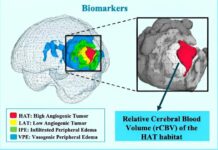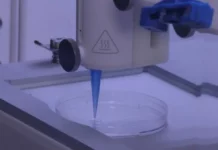Diffuse intrinsic pontine glioma (DIPG) is a rare and aggressive tumor of the brainstem that usually affects children. Its symptoms include weakness in the limbs and difficulties in walking, controlling facial expressions, talking, and eating. The tumor is fatal, with less than one percent chance of a child surviving 5 years.
Currently, radiotherapy is the treatment of choice for DIPG as its diffuse nature and unclear margins make surgical resection difficult.
However, recently, scientists from The Institute of Cancer Research, London, and The Royal Marsden NHS Foundation Trust took a new approach to DIPG treatment. They decided to use an AI drug discovery platform created by BenevolentAI to figure out how to treat the tumor.
The target
The platform involves a knowledge graph that the company creates by feeding their AI system publicly available medical data and scientific articles. Through this graph, the researchers discovered that combining two existing drugs, vandetanib and everolimus could help extend the survival rate in a DIPG patient.
This treatment targets a gene mutation called ACVR1, present in around 25% of DIPG patients.
The first of these drugs, vandetanib, is used to treat thyroid cancer but is also effective against the ACVR1 mutation. However, the drug cannot penetrate the blood-brain barrier effectively enough to reach a potent concentration.
This is where everolimus comes in. According to the AI, the drug may help sustain vandetanib’s concertation inside the brain, creating a synergistic effect.
But does the AI proposed combination work?
The scientists from ICR checked the drug combination’s efficacy to treat mice with DIPG. They found that everolimus increased vandetanib’s concentration in the brain by 56%. Furthermore, the combination extended the mice’s survival rate by 14%
compared to the control group.
-Professor Kristian Helin, Chief Executive of The Institute of Cancer Research, London
“The use of AI promises to have a transformative effect on drug discovery, by identifying the most promising drug targets, understanding the structures of proteins from their amino acid sequence, or as here, proposing ways of combining existing drugs together to create powerful new combinations.”
The scientists have also begun initial testing in 4 human DIPG patients and are planning to hold clinical trials soon.
-Study author Chris Jones, Professor of Paediatric Brain Tumour Biology at The Institute of Cancer Research, London:
“We still need a full-scale clinical trial to assess whether the treatment can benefit children, but we’ve moved to this stage much more quickly than would ever have been possible without the help of AI.”
Source: The Institute of Cancer Research
https://www.icr.ac.uk/news-archive/scientists-use-ai-to-identify-new-drug-combination-for-children-with-incurable-brain-cancer
Journal: Cancer Discovery




